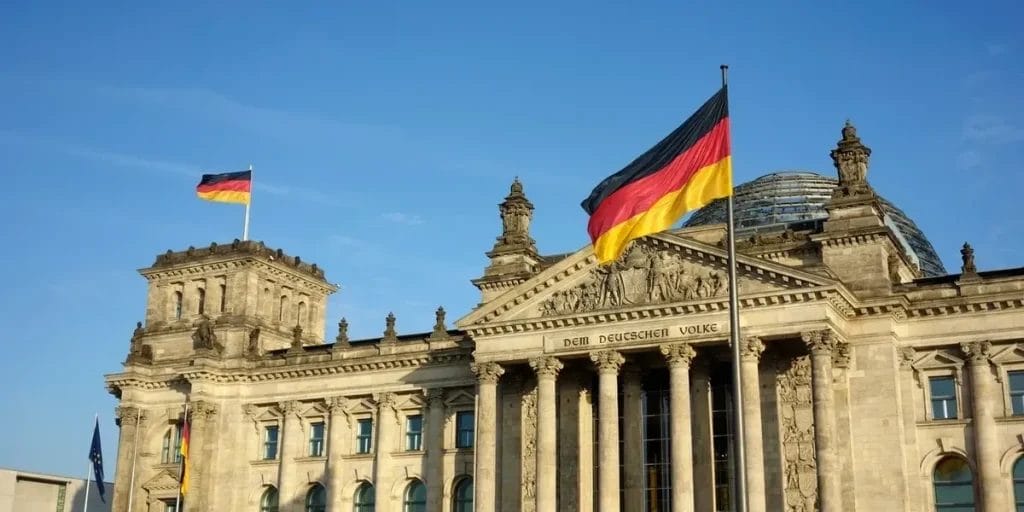
The results of Germany’s general election on Sunday mark the end of a key pillar of Germany’s business model: political stability. Fredrich Merz’s CDU/CSU coalition has won the majority of votes (28.5%) and seats (208), followed by the AfD (20.8%, with 152 seats), SPD (16.4%, 120), Greens (11.6%, 85), the Linke (8.8%, 64), and SSW with 1 seat. Bündnis Sahra Wagenknecht – BSW (4.97%) and the Liberals (4.3%) didn’t reach 5% and were left outside parliament. The biggest challenge for Merz now is to find a coalition to support his government in parliament.
Theoretically speaking, the CDU and the SPD may have enough seats to secure a thin majority (328 seats vs 315 needed for a majority), which could be reinforced by the presence of the Greens; but are their programs politically compatible? The traffic light coalition that has recently collapsed (SPD, Greens, and Liberals), leading to Germany’s first early elections since 1983, showed how unstable three-party coalitions can be. Additionally, a coalition of mainstream parties (CDU, SPD and Greens) could buy them four more years in power, but in case of disappointment by the electorate (which is likely given the heterogeneity of party programs), four years from now, the AfD would be in pole position to become the first party in parliament, as it happened to Italy’s Giorgia Meloni after Draghi’s large-coalition government.
On the other hand, the CDU could try to form a government with the AfD, as both Elon Musk and Donald Trump have been pushing for in the last few months. But Merz saw what happened when the AfD voted for his anti-immigration plan in parliament: a revolt of his own base, as well as a tough reprimand from Angela Merkel, the former CDU chancellor.
So now Germany needs to start to learn how to live with political instability, as France has started to do since 2022 when Macron was re-elected president without a parliamentary majority. Paradoxically, Italy – the undisputed European champion of political instability – has been enjoying a stable government since the victory of the centre-right coalition led by Fratelli D’Italia’s Giorgia Meloni in September 2022.
With the collapse of political stability, Germany loses another bastion of its business model, as we discussed recently in our research.
First, its reliance on Russian gas has proven to be a critical vulnerability. With geopolitical tensions and sanctions, the supply chain has been severely disrupted, leaving Germany scrambling for alternative energy sources. Second, the decision to phase out nuclear power has compounded the energy crisis. While it was part of a move towards greener energy, the transition has not been seamless, resulting in energy shortages and increased dependence on fossil fuels.
Moreover, Germany’s export-driven economy has faced significant challenges. The economic slowdown in China, one of Germany’s largest markets, has led to decreased demand for German goods, impacting industries like automotive and machinery. Additionally, the value chains linked to Eastern European countries, such as Hungary and Czechia have been strained. These countries have become less stable partners, affecting the flow of goods and services critical to Germany’s manufacturing sector.
Germany’s reliance on the United States for military security has also been a point of contention. With shifting US foreign policies and calls for increased European defense spending, Germany faces pressure to re-evaluate its defense strategy. Furthermore, the EU German-Franco Axis, once a symbol of European unity and economic strength, is facing its own set of challenges. Political differences and economic disparities have strained this alliance, impacting Germany’s influence within the EU.
Finally, the policy of Schwarze Null (Black Zero), aimed at maintaining a balanced budget and limiting debt, has restricted fiscal flexibility. In times of economic stress, this policy has hindered Germany’s ability to respond effectively to crises.
Germany is at the heart of the European integration process. Without a strong Germany, the process is set to stall, and potentially reverse, exactly at the time when Donald Trump is trying to play “divide and conquer” within Europe and its NATO allies. All this seem to be good news only for China and Russia.